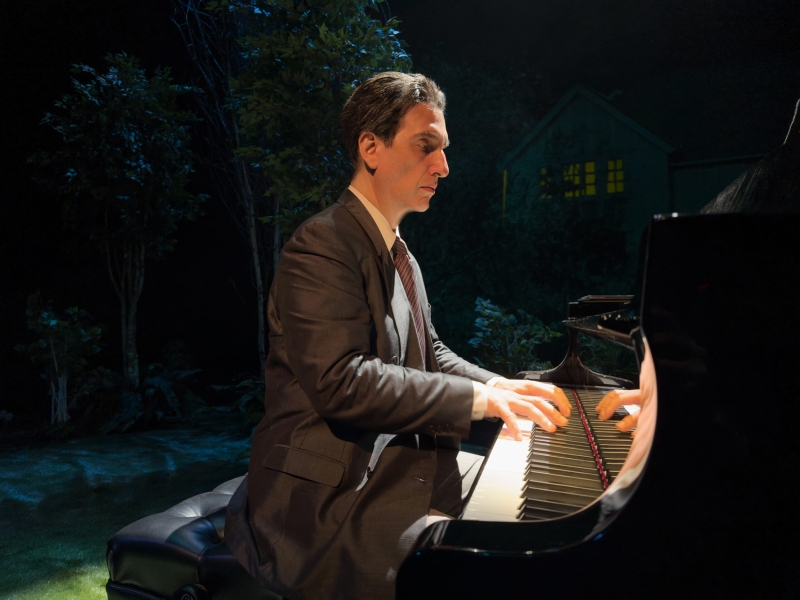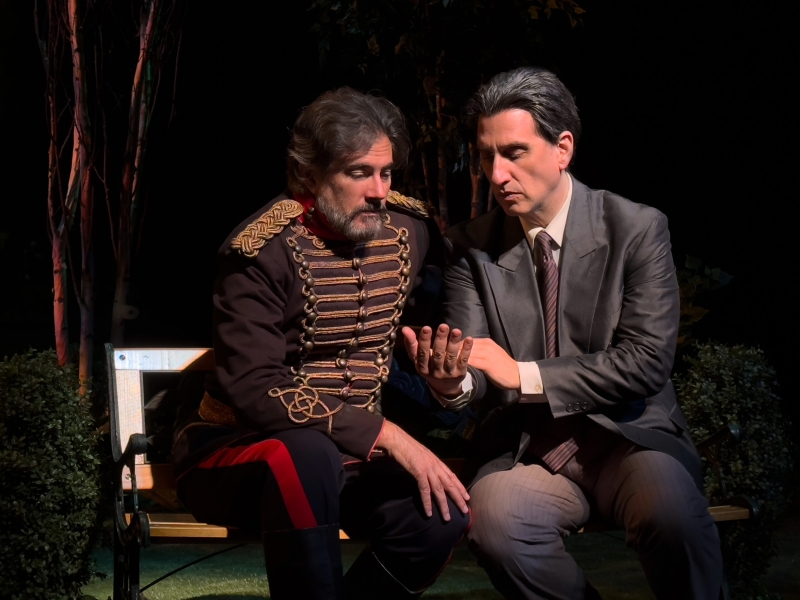Interview: Hershey Felder of RACHMANINOFF AND THE TSAR at TheatreWorks Silicon Valley
The perennially popular pianist/actor/playwright returns to Mountain View in his final composer play January 10th to February 9th
Sometimes I really wish I had Hershey Felder’s life. The renowned pianist/actor/playwright/producer gets to travel the world performing for adoring audiences then come home to Florence, Italy where he lives in a centuries-old villa with views over the city and always seems to be hosting a different flock of internationally-acclaimed artists. Not that any of this is unearned. Far from it. He’s one of the hardest working people I’ve ever encountered, always engaged in multiple projects, and continues to produce new work at an astonishing pace. In just the past year or so, aside from portraying characters such as George Gershwin and Frederic Chopin in his stage plays, he’s made films, premiered his opera in the ancient Roman amphitheater in Fiesole, Italy, and become artistic director of not one, but two historic theaters in Florence.
Lucky for TheatreWorks Silicon Valley audiences that he’s somehow found the time to come back to his Northern California artistic home for a month’s run of his newest and, he says, final composer play, Rachmaninoff and the Tsar. Written by Felder himself and affording him ample opportunity to perform some of the greatest music ever written, the play also marks the first time he’ll be joined onstage by another actor, Jonathan Silvestri in the role of Tsar Nicholas II. Felder paints a portrait of the famous composer at the very end of his life, decades after he’s left his native Russia, as he lies in bed in Beverly Hills in a state of delirium and revisits seminal events from his personal history.
I spoke with Felder from his home in Florence a couple of weeks ago, which I believe is the 12th time I’ve had the pleasure of chatting with him. It was 11:00pm in Italy, the end of another busy day for Felder, having recently seen off his holiday guests. We talked about Rachmaninoff and the Tsar, why he believes the composer’s artistry as a pianist is unmatched, what it’s like to have another actor onstage with him after all these years and the fun he’s having as artistic director of those two Florentine theaters. As if that weren’t enough, when I happened to mention that I’m a ballet fan, Felder told me he’d just hosted Mikhail Baryshnikov in Florence. Yeah, the guy’s life is like that. The following conversation has been condensed and edited for clarity.
Happy Hanukkah! How have your holidays been going?
You know, guests and rehearsing and eating and more eating. The trajectory becomes bed – fridge – piano, so… [laughs]
Is Rachmaninoff and the Tsar really going to be your final composer play? Say it ain’t so!
Well, it’s the last new one in this format. There’ll be movies and I’ll investigate other formats, maybe even with other composers, but it’s been 30 years of this format so I think shifting a little bit might be a good plan.
I imagine that finally getting to perform this show live onstage is a bit of unfinished business for you. I believe you were in the thick of final rehearsals for it when the pandemic hit in 2020.
Yeah, that is correct. If I’m not mistaken, this show was meant to open in April of that year and we were here in Florence rehearsing and preparing to get it ready, and we know what happened then. But that is, amazingly, five years ago. I mean, how time flies, huh?

One of the unique things about your work is that you never do just straightforward biography.
No. I tend to focus my work on telling the story of what happened, but the “what happened” is not just “and then I wrote… and then I did…” It’s “This is what happened to me, and there’s a reason it happened and I came out with the music I did. (“I” meaning the character.) There’s always an underlying reason as to why I am telling that particular story.
What is the particular story you’re telling with Rachmaninoff and the Tsar?
Well, he’s at the end of his life in this story. He died of melanoma in 1943 just before his 70th birthday, and he had just gotten American citizenship 8 weeks before. He was very sick and it happened quite quickly. He was in Los Angeles and heavily sedated with morphine in order to get through the pain, which was very debilitating.
Apparently, he was mumbling all kinds of things, and he would lift his hands and play piano in the air and do things like that. It struck me what would be going on in the mind of somebody of that greatness at the end of his life, being sedated, hallucinating and mumbling things about his history and so on?. So that’s the goal with this one, and it’s the first time I’ve done a composer character onstage with another actor.
What’s that like when you’re so used to being onstage being by yourself?
Well, it’s a lot more fun. It’s also something audiences don’t normally get to see me to do, which is act with other people. This time they get to see someone else, which I hope is interesting to them, and it’s also a different way of telling a story. I like playing this one because I adore the actor I’m working with, Jonathan Silvestri, who’s a great guy and a lot of fun to be with, and we have a great symbiosis onstage. And the dressing room is not as dull! [laughs]
How did you originally connect with Jonathan Silvestri?
Several years ago, I was casting for the role of Delacroix in my Chopin movie, and he was one of the names that came up. He sent a particular photo that looked a lot like Delacroix, or certainly very period, and he had the right voice. Then we did the movie and he of course was wonderful in it. He and his whole family became good friends (he’s got a wife and two little ones), and I wanted to work with him again. I said, “Interested in playing a murderous tsar?” [laughs] And he said, “Oh, sure. Why not?”

I imagine this particular show is quite a workout for you at the piano.
Oh, God, yeah!
Is Rachmaninoff’s music as difficult to play as it sounds?
It is. But, you know, what isn’t difficult? Everything is hard, if it’s to be done well. There’s responsibility [to the composer and the audience], there’s the physicality of it. People think more notes is hard, but once you can play a lot of notes you can play a lot of notes, there’s no big deal in that. It’s about making music and making it beautiful and putting across the composer’s intention and understanding the context and playing it properly.
At a certain level in piano, you just learn how to play, and you play. Some play faster, some play slower, some play with more beautiful tone, some play with less beautiful tone, but it’s what you do with the whole thing. It’s not about “Gee, so many notes!” And that’s where I think sometimes a mistake is made. People think, “Oh, look at all that! It goes fast, it’s loud, it’s impressive.” That’s not really what is difficult. What is difficult is making the music resonate. That’s what’s difficult, no matter what you do, even if it’s Beethoven’s “Für Elise” or something like that.
I ran across a quote from you some years ago that you considered Rachmaninoff to be the “finest pianist the world has known.” Do you still stand by that statement?
Yes. He’s got the elegance and grandeur of a whole other time. There’s a stateliness, a musicality, a tone, a perfection in what he did with his fingers. It’s all correct. I don’t know how to describe it as anything other than noble. It’s so beautiful, and he was able to do anything with the instrument. There’s such a humility in that. He was really something.
My personal favorite Rachmaninoff composition is Rhapsody on a Theme by Paganini because it’s just so drop-dead gorgeous. What’s the story behind how he came to compose that?
I assume you’re talking about the “18th Variation” because that’s the famous one. It became a popular theme after it was used in the movie Somewhere in Time with Christopher Reeve and Jane Seymour. It’s really very beautiful and how and why he came up with it is in the play. I’m not going to give it away, but it is a main focus to our story, in fact.
I’ve never seen Somewhere in Time, but I know the “18th Variation” because I’m a ballet lover and there have been several ballets set to it.
Well, if you want to talk about ballet, I just hosted a new friend of mine here this week, my new buddy Baryshnikov, who’s really amazing. I got to hang out with him and played a little of the “18th Variation” for him and he told me, “Oh, I danced to that.” At my theater, I hosted the 40th anniversary of the movie White Nights, so he and Helen Mirren and [director] Taylor [Hackford] came. It was a big event last week, and we had a lot of fun doing it.
How are things are going with your theater in Florence?
Oh, there’s two of them now.
I didn’t realize that!
Yeah, I have Teatro Niccolini and also Teatro della Signoria. Niccolini is the oldest theater in Florence, built in 1648. I opened the season with Jeff Goldblum, now Helen and Misha were just here. And I had Santino Fontana and Seth Rudetsky, lots of really famous pianists, I had Linda Purl and Patrick Duffy in A.R. Gurney’s Love Letters, a lot of Italian stuff, some British plays, and I also did Rachmaninoff here. It’s been fun programming for an Italian audience and a worldwide audience in Florence’s most historic theater. I’ve kinda become known as an artistic director here so that’s fun, too. Signoria will open later in the season because it’s still under restoration, but Niccolini is full-throttle ahead. It’s been quite a season, I must say.
Your life always sounds amazing and full of surprises.
Oh, God, it’d be nice to not have so many surprises for a while. That’d be a good thing!
You recently led a tour of Italy for TheatreWorks supporters. What was that experience like for you?
It was fun entertaining them because we had 40 people from TheatreWorks, and I had movie and TV and Broadway stars, and Italy as the main star. Not to mention the food, which was the serious main star. Hard to go wrong in Italy! It’s nice to be able to bring patrons here. They all want to know where my stuff comes from, so this was a really nice experience being able to share that with the group, and hopefully we’ll be able to do more.
(all photos by Stefano DeCarli)
---
Rachmaninoff and the Tsar will be presented January 10 – February 9, 2025 at Mountain View Center for the Performing Arts, 500 Castro Street. For tickets and more information, visit TheatreWorks.org or call 877-662-8978.
Comments
Videos

